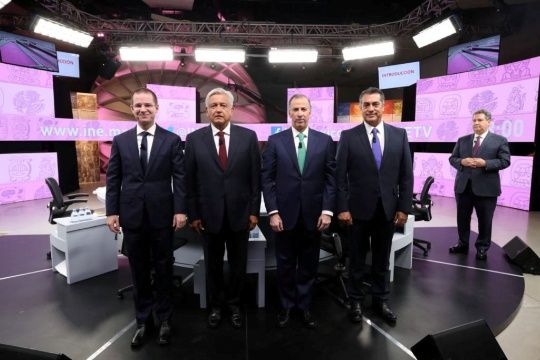With Donald Trump playing the role of spoiler in trade negotiations and agreements with most of United States' key import partners, Andres Manuel Lopez Obrador, the front-runner in Mexico's presidential elections, has said would redirect the country's economy towards internal markets and revive the rural economy to deal with a collapse of the North American Free Trade Agreement.
RELATED:
“I am going to suggest that the treaty remains, but (the end of NAFTA) cannot be fatal for Mexicans, our country has a lot of natural resources, a lot of wealth,” said Lopez Obrador in the last debate before between presidential candidates in the city of Merida, Yucatan state.
At the beginning of his administration, Trump threatened to pull out of the agreement with Canada and Mexico if they refused to renegotiate it. However, the negotiations, which started on August 16, 2017, have advanced slower than expected and have been hampered by Trump's decision to impose a 35 percent tariff on steel and a 10 percent tariff on aluminum imported from both Mexico and Canada. Shortly after, as the seventh round of renegotiations concluded, Trump said he would exempt Mexico and Canada from those tariffs if they agreed to a new NAFTA.
Trump has called NAFTA the “worst trade deal in history” because of the massive deficit with Mexico and supposedly unfair conditions.
In 2017, the U.S. bought US$71 billion more imports from Mexico than what Mexico got from the U.S. Mexico dramatically increased their farm exports to the U.S. since 1994, the year NAFTA was implemented, and hundreds of thousands of auto-manufacturing jobs have been created.
But in fact, the agreement hasn't helped Mexico to counter its economic problems and has even widened them.
Between 1993 and 2013, Mexico's economy grew an average of a paltry 1.3 percent, unemployment has increased, and poverty rates remain at the same level as in 1994.
Also, Mexico's dependency on food imports has increased, even in the national symbol of food sovereignty: corn.

Farmers and members of the National Zapatista Liberation Army have opposed the deal since the early 1990s citing the detrimental impact it has had on low-scale farmers across the country. Now that the country's politicians and business elite are discussing it again these issues have resurfaced.
Lopez Obrador has declared himself a supporter of a more internal market-oriented economy, and admirer of Mexico's import substitution policies.
Last week, Lopez Obrador's chief economic adviser Gerardo Esquivel said that “no NAFTA is better than a bad NAFTA” while articulating the center-left candidate's policy on trade, but said they are committed to the renegotiation of the agreement.
"We are not looking for a bilateral agreement with the U.S. or Canada. The trilateral agreement is what we want,” he said.
The renegotiations may last until after Mexico's July 1 presidential elections, but the winning candidate won't be sworn in until December.
With just over two weeks before voters head to the polls, the debate was one of the last chances for the pack of trailing candidates to whittle down leftist Lopez Obrador’s lead.
The four contenders tussled over their visions for changes to Mexico’s healthcare and educations systems, but neither landed any game-changing knockout punches.
The former Mexico City mayor, in his third bid to reach the presidency, came out unscathed from two prior debates and has since widened his double-digit lead in most polls.
RELATED:
He has double the support of Ricardo Anaya, who heads a right-left coalition, according to a nationwide survey published earlier Tuesday.
Lopez Obrador again pledged to fund big spending projects by ending corruption but was accused by Anaya of handing out contracts without public tenders when he was mayor of Mexico City.
Lopez Obrador denied the accusation and Anaya held up a placard directing viewers to a website for evidence of his assertions.
But that website was down, and a spokeswoman for Anaya said in an emailed statement that the site had likely suffered a Distributed Denial of Service (DDoS) cyber attack.
Lopez Obrador, 64, has benefited from widespread disenchantment with the ruling Institutional Revolutionary Party (PRI) over political corruption, record levels of violence and sluggish economic growth.
PRI candidate Jose Antonio Meade, who is running third in most polls, and independent hopeful Jaime Rodriguez, also baited Lopez Obrador.
But the gray-haired politician did not bite. In the debate, Lopez Obrador showcased the more relaxed, jovial figure he has cut on the campaign trail, mostly avoiding the kind of outbursts that in the past helped adversaries depict him as a radical menace to stability in Latin America’s second-largest economy.
Lopez Obrador has painted himself as more of a pragmatist and now says he wants to broker a deal with Trump to stem illegal immigration through jobs and development rather than a border wall.